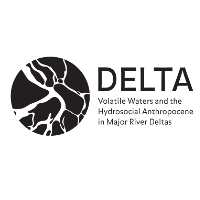This collection is a direct result of our January 2018 workshop on Research Methods for Volatile Lifeworlds in the Hydrosocial Anthropocene. Since the workshop, some of the participants have turned their presentations into short chapters focusing on some of the practicalities and conceptual challenges of doing research in deltas and with inhabitants of other wet places.
The collection has been published in the open access series Cologne Working Papers in Cultural and Social Anthropology (KAE) and can be downloaded directly from the University of Cologne's online repository here.
The two main questions that this working paper addresses are:
- What ethnographic tools may serve to capture and understand the worlds of people inhabiting riverbanks, coast and deltas? and
- What is specific about fluvial, coastal and deltaic lifeworlds that needs specific fieldwork methods?
In tackling these questions, it brings together contributions from eight researchers whose empirical work is set in watery environments, characterized by socially and ecologically uncertain transformations and what we call ‘hydrosocial’ relations. The term ‘hydrosocial’ points to the recognition that social and hydrological relations often closely correspond, in that water flows may mirror political and economic power, and human subjectivities may be shaped by the qualities, quantities and timings of water. Discussing past and current research endeavours, challenges and attempted solutions, the contributions share some of the researchers’ experiences in exploring hydrosocial lifeworlds.
Three crosscutting themes may be identified:
- The fractal geography of watercourses and their inhabitants requires a multi-scalar research approach that compliments fine-grained ethnographic fieldwork with zooming out spatially and temporally.
- In order to understand local hydrosocial life, we must pay specific attention to the social and material flows that move in and out of these places, including waters, ideas, sediments, practices, people and fish.
- Moving along with our interlocutors – e.g. on walks or boat rides – is essential for finding out about things that would not be part of sit-down conversations, for learning about their situated practices, and for understanding the flexibility that often makes life possible in volatile hydrosocial contexts.
The working paper's table of contents is as follows, with contributions by DELTA team members appearing in bold. Enjoy reading!
1. Introducing Delta Methods (Franz Krause)
2. Scaling a River (Mark Harris)
3. From Rivers to Deltas: Some Conceptual and Methodological Routes (Naveeda Khan)
4. River Deltas in the Context of the Anthropocene Debate (Matt Edgeworth)
5. Of Salt and Drought – What Methods for Ethnographic Research in Fluid Places? (Nora Horisberger)
6. Walking the Anthropocene: Exploring Multispecies Relations in Coastal Ecuador (Michael Viña)
7. Around and Around: ‘Kyauk Pyin’, Alluvial Lands and the Challenges of Ethnographing Volatility in the Ayeyarwady River Delta (Benoit Ivars)
8. Trapping Trappers, and Other Challenges of Ethnographic Fieldwork in the Mackenzie Delta (Franz Krause)
9. Fearing Together, Fearing Alone: Fieldwork under the Possibility of Fire (Sandro Simon)

